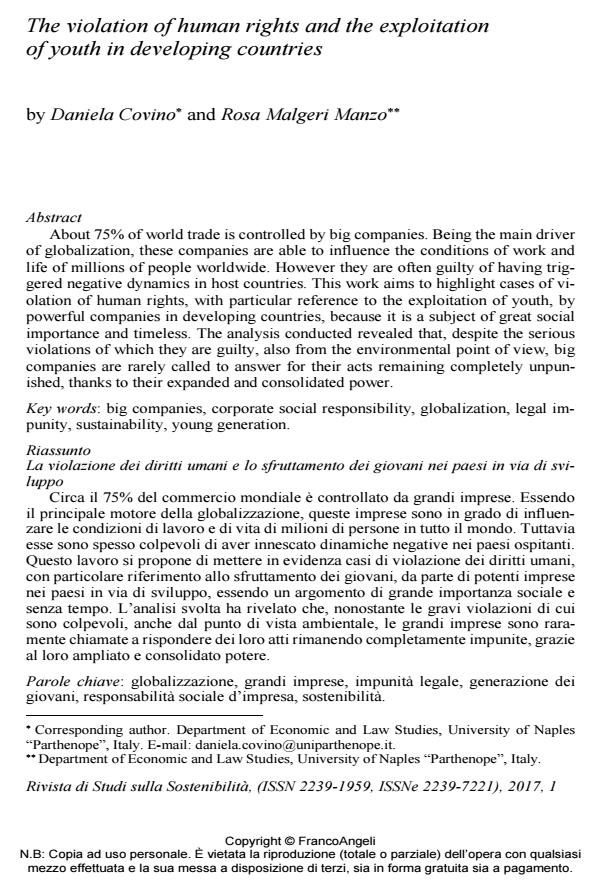The violation of human rights and the exploitation of youth in developing countries
Titolo Rivista RIVISTA DI STUDI SULLA SOSTENIBILITA'
Autori/Curatori Daniela Covino, Rosa Malgeri Manzo
Anno di pubblicazione 2017 Fascicolo 2017/1
Lingua Inglese Numero pagine 20 P. 27-46 Dimensione file 195 KB
DOI 10.3280/RISS2017-001004
Il DOI è il codice a barre della proprietà intellettuale: per saperne di più
clicca qui
Qui sotto puoi vedere in anteprima la prima pagina di questo articolo.
Se questo articolo ti interessa, lo puoi acquistare (e scaricare in formato pdf) seguendo le facili indicazioni per acquistare il download credit. Acquista Download Credits per scaricare questo Articolo in formato PDF

FrancoAngeli è membro della Publishers International Linking Association, Inc (PILA), associazione indipendente e non profit per facilitare (attraverso i servizi tecnologici implementati da CrossRef.org) l’accesso degli studiosi ai contenuti digitali nelle pubblicazioni professionali e scientifiche.
About 75% of world trade is controlled by big companies. Being the main driver of globalization, these companies are able to influence the conditions of work and life of millions of people worldwide. However they are often guilty of having triggered negative dynamics in host countries. This work aims to highlight cases of violation of human rights, with particular reference to the exploitation of youth, by powerful companies in developing countries, because it is a subject of great social importance and timeless. The analysis conducted revealed that, despite the serious violations of which they are guilty, also from the environmental point of view, big companies are rarely called to answer for their acts remaining completely unpun-ished, thanks to their expanded and consolidated power.
Circa il 75% del commercio mondiale è controllato da grandi imprese. Essendo il principale motore della globalizzazione, queste imprese sono in grado di influenzare le condizioni di lavoro e di vita di milioni di persone in tutto il mondo. Tuttavia esse sono spesso colpevoli di aver innescato dinamiche negative nei paesi ospitanti. Questo lavoro si propone di mettere in evidenza casi di violazione dei diritti umani, con particolare riferimento allo sfruttamento dei giovani, da parte di potenti imprese nei paesi in via di sviluppo, essendo un argomento di grande importanza sociale e senza tempo. L’analisi svolta ha rivelato che, nonostante le gravi violazioni di cui sono colpevoli, anche dal punto di vista ambientale, le grandi imprese sono raramente chiamate a rispondere dei loro atti rimanendo completamente impunite, grazie al loro ampliato e consolidato potere.
Parole chiave:Globalizzazione, grandi imprese, impunità legale, generazione dei giovani, responsabilità sociale d’impresa, sostenibilità
Daniela Covino, Rosa Malgeri Manzo, The violation of human rights and the exploitation of youth in developing countries in "RIVISTA DI STUDI SULLA SOSTENIBILITA'" 1/2017, pp 27-46, DOI: 10.3280/RISS2017-001004